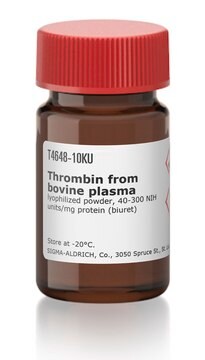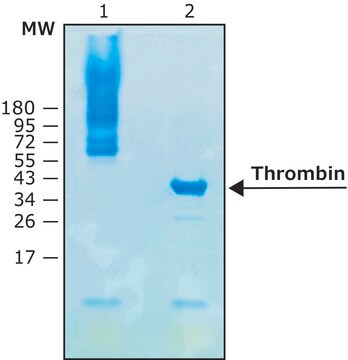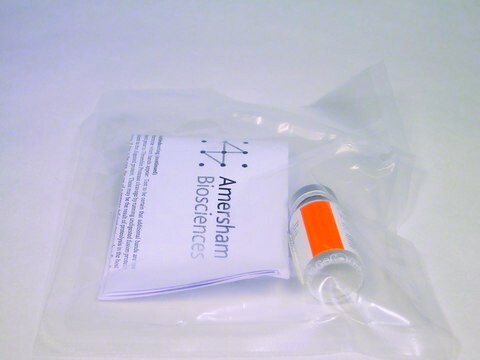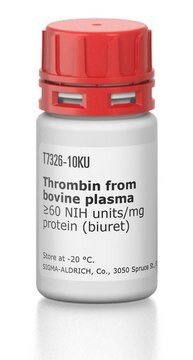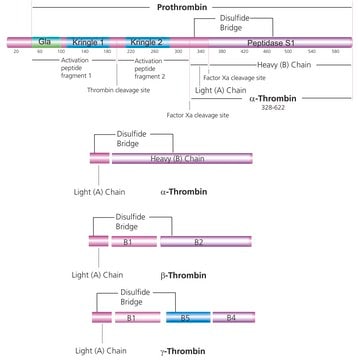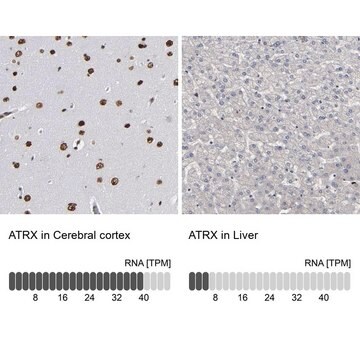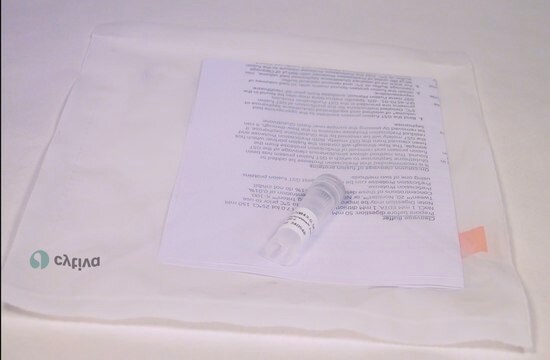RECOMT
Thrombin CleanCleave™ Kit
Synonym(s):
Thrombin Cleavage Kit
Sign Into View Organizational & Contract Pricing
All Photos(1)
About This Item
UNSPSC Code:
12352200
NACRES:
NA.56
Recommended Products
form
suspension
Quality Level
mol wt
37 kDa
technique(s)
protein purification: suitable
shipped in
wet ice
storage temp.
2-8°C
General description
The Thrombin CleanCleave Kit contains a 50% suspension fo thrombin-agarose produced by immobilizing bovine thrombin and is designed for cleavage of recombinant fusion proteins
Application
For cleaving a tag from a recombinant fusion protein which contains the thrombin recognition sequence. Thrombin-agarose is compatible with recombinant proteins expressed in various types of expression systems.
Features and Benefits
- Fast, efficient cleavage in as little as 2 hours
- Thrombin is covalently bound to agarose for easy removal.
- The robust cleavage reaction is effective at temperatures from 4 °C to 37 °C and over a wide range of pH and ionic strengths.
- Cleave tags even in the presence of 0.1% Triton™, 1 M urea or 5 mM EDTA
- Thrombin-agarose is reusable.
Quantity
200 μl of a 50% slurry of thrombin-agarose cleaves >85% of 1 mg of fusion protein.
Legal Information
CleanCleave is a trademark of Sigma-Aldrich Co. LLC
Triton is a trademark of The Dow Chemical Company or an affiliated company of Dow
Kit Components Only
Product No.
Description
- Thrombin Cleavage Buffer, 10× 10 mL
related product
Product No.
Description
Pricing
Storage Class Code
10 - Combustible liquids
Flash Point(F)
Not applicable
Flash Point(C)
Not applicable
Certificates of Analysis (COA)
Search for Certificates of Analysis (COA) by entering the products Lot/Batch Number. Lot and Batch Numbers can be found on a product’s label following the words ‘Lot’ or ‘Batch’.
Already Own This Product?
Find documentation for the products that you have recently purchased in the Document Library.
Customers Also Viewed
Anna-Maj Albertsson et al.
Journal of neuroinflammation, 11, 197-197 (2014-12-04)
Osteopontin (OPN) is a highly phosphorylated sialoprotein and a soluble cytokine that is widely expressed in a variety of tissues, including the brain. OPN and OPN-derived peptides have been suggested to have potential neuroprotective effects against ischemic brain injury, but
Jolanta Krucinska et al.
Biochemistry, 58(9), 1188-1197 (2019-02-05)
Enolase is a glycolytic metalloenzyme involved in carbon metabolism. The advantage of targeting enolase lies in its essentiality in many biological processes such as cell wall formation and RNA turnover and as a plasminogen receptor. We initially used a DARTS
Takeshi Uchida et al.
The Journal of biological chemistry, 279(50), 51981-51988 (2004-10-07)
The heme chaperone CcmE is a novel protein that binds heme covalently via a histidine residue as part of its essential function in the process of cytochrome c biogenesis in many bacteria as well as plant mitochondria. In the continued
Ohad Fisher et al.
Nucleic acids research, 32(1), 287-297 (2004-01-13)
The DNA methylation status of the protozoan parasite Entamoeba histolytica was heretofore unknown. In the present study, we developed a new technique, based on the affinity of methylated DNA to 5-methylcytosine antibodies, to identify methylated DNA in this parasite. Ribosomal
Andrea Angeli et al.
Journal of enzyme inhibition and medicinal chemistry, 36(1), 758-763 (2021-03-16)
We report the first activation study of the β-class carbonic anhydrase (CA, EC 4.2.1.1) encoded in the genome of the protozoan pathogen Trichomonas vaginalis, TvaCA1. Among 24 amino acid and amine activators investigated, derivatives incorporating a second carboxylic moiety, such
Articles
This page shows how to cleave and purify GST-tagged proteins bound to GSTrap from Cytiva.
Our team of scientists has experience in all areas of research including Life Science, Material Science, Chemical Synthesis, Chromatography, Analytical and many others.
Contact Technical Service